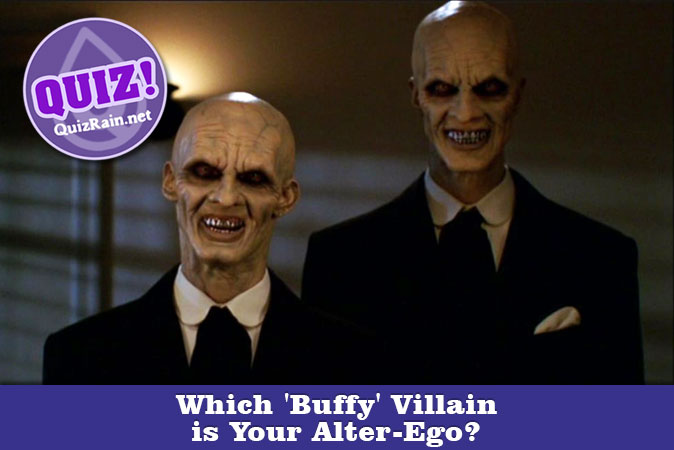Which ‘Buffy’ Villain is Your Alter-Ego?
Welcome to quiz! Are you a sneaky planner like Master or a tough fighter like Glory? Find out which Buffy villain is your alter-ego! Dive into questions about your personality and skills. Discover your true self. So, hit that Start button below. Let your inner darkness shine!

Buffy the Vampire Slayer is a cult fave. It follows Buffy Summers, a regular high school girl. She learns she is chosen to fight vampires and other creepy stuff. With friends and a wise mentor, she battles evil while dealing with teenage drama. Action, humor and drama mix together. Fans still love it today.
Meet the villains from Buffy
The Master
The Master is that ancient, velvet-voiced vampire boss who gives you the creeps in the best old-horror-movie way — looming presence, creepy smile, always a little too pleased with his own doom-ish poetry. He runs his cult like a formal tea party that occasionally ends in sacrifice (and yes, he probably does like tea; don’t ask why he prefers bone china). Ancient, patient, and obsessed with the Hellmouth, he’s terrifyingly calm and also melodramatic in a way that makes you almost admire the dedication. He hates the sunlight, obviously, but would also judge your sunhat choices very harshly for reasons you can’t explain. There’s this weirdly genteel dignity about him that sits next to pure predatory hunger and it’s dissonant and delicious.
Drusilla
Drusilla is the delightfully unhinged vampire who flutters between giggling and horrifying prophetic visions like she’s swapping accessories. She’s visibly fragile — pale, dreamy, addicted to her own dramatics — but don’t be fooled, she’ll stab you with a smile and then hum a nursery rhyme about it. There’s a childlike, gothic whimsy to her that makes her cruelty feel almost ornamental; tarot cards, dolls, broken music boxes, the whole, uh, aesthetic. Sometimes she’s tender, sometimes she’s petulant; sometimes she claims to be clairvoyant, sometimes she misses the point of basic physics — very inconsistent but very memorable.
Angelus
Angelus is the charming, polished nightmare who speaks like a gentleman and kills like he’s doing you a favor — diabolically witty and devastatingly personal. He’s all smiles, impeccable haircut, and elaborate manipulation tactics, and then he goes off-script and does something monstrously intimate that leaves you reeling. There’s a dark elegance to him, like someone who collects rare books and scalps enemies, and yes he sometimes gets nostalgic in the weirdest, most menacing way. He claims to care about art and poetry but mostly uses them as the soundtrack to other people’s misery; occasionally you catch a flicker of something like regret and then remember nope, that was a trick.
Mayor Richard Wilkins III
The Mayor is your polished small-town official with a terrifyingly sunny disposition and a snake-obsessed midlife-crisis vibe, which does not look good on municipal letterhead. He’s affable, loves parades, ribbon-cuttings, and civic pride — like seriously into commemorative plates — but underneath is a patient, political mastermind who literally becomes a giant snake (like, dramatic transformation, not metaphor). He’s bureaucratic evil: charming, plausible, with an eye for infrastructure and eternal power, which is both terrifying and a little ridiculous in the best way. He’ll smile and compliment your landscaping while plotting the End Times, which is oddly efficient and somehow bureaucratic about doom.
Professor Maggie Walsh
Professor Walsh is the impeccably competent Initiative head who believes in science like it’s a religion, and honestly she’s persuasive about it — lab coats, clipped hair, very coffee-mug serious. She’s brilliant, methodical, and coldly practical, but also has this weird flinty maternal streak that shows up in odd ways (will scold you like a teacher then patch you up). She builds monsters for research and calls it progress, which is simultaneously chilling and, to her, totally reasonable. She claims to value ethics until an experiment gets interesting, at which point ethics becomes a “debate topic” and that’s when things go sideways.
Adam
Adam is Frankenstein punk: muscles, metal, demon bits and a very confused sense of fashion (industrial chic meets bad hair day). He’s physically imposing and unnervingly intelligent in a laboratory-assembled way, like if a textbook learned how to be violent. Adam likes classical music? Or was that just a glitch where he tried to be cultured — either way he’ll recite philosophy and then punch a hole through a wall because feelings are complicated. He’s part man, part machine, part agenda, and completely fascinated with himself, which makes him unpredictable and oddly sympathetic if you squint.
Glory
Glory is the manic, glamour-queen god who thinks the universe revolves around her — because it literally does for her, and she’s not shy about it. She’s bombastic, loud, indulgent, and petty, with flashes of inexplicable tenderness (she might want your attention and also your blood, sometimes simultaneously). Everything is bright colors and headaches around her: regal, entitled, and prone to temper tantrums that can collapse reality, which, honestly, is a dramatic power move. She’s cruel and childlike at once — demanding devotion like a diva but getting bored if you don’t entertain her properly — which makes her ridiculously dangerous and weirdly relatable in a spoiled way.
Warren Mears
Warren is the tech-bro who tried to be cool and invented cruelty as a hobby; he’s small, mean, and has the emotional depth of a cracked smartphone screen. He’s good with gadgets (dangerously good), petty, and powered by ego and jealousy, always angling for the spotlight and someone to blame. He wants to be taken seriously as a mastermind but ends up doing cowardly, selfish stuff — remembers to unplug things but not to be a decent human. There’s a pathetic, almost pitiful quality to him (collects action figures? definitely a loser vibe), which somehow makes his nastiness both frustrating and strangely human.
Caleb
Caleb is the chain-smoking, Bible-quoting wrecking ball — brutal, unhinged, and convinced he’s doing divine work, which is terrifyingly efficient. He’s physically brutal and ideologically furious, the kind of villain who grins while breaking things and thinks that’s virtue. He’s jaw-droppingly misogynistic and gleefully violent but also has these odd moments where he mutters a hymn or tries to be poetic and fails gloriously. He’s not subtle, he’s not neat, and he somehow shows up smelling faintly of motor oil and righteous fury; contradictory, single-minded, and very loud.
The First Evil
The First Evil is the cold, patient void that makes manipulation look like fine art — it doesn’t need a body, it just needs time, whispers, and your insecurities. It can take any dead face and wear it like a costume, which is unnerving because your memories betray you and the enemy is literally nothingness with a smile. It claims no desires and then very clearly desires the slow dismantling of everything you care about, all with dispassionate, almost maternal calm. It’s ancient and bored and therefore brilliant at sowing doubt, and it delights in being the smallest, quietest kind of terror — like a shadow you can’t quite find but you know it’s there.
Leo is the kind of person who can talk passionately about his favorite shows for hours. He’s a natural quiz creator with a quick sense of humor, and he loves helping others explore what makes them tick. His quizzes often mix lighthearted fun with a touch of introspection, creating an experience that feels personal and engaging. Leo’s approach to quizzes is all about making fans feel like part of the world they love, one question at a time.





